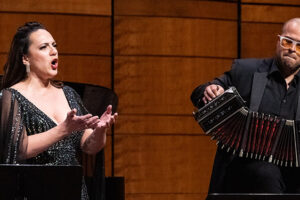

If you love Gluck’s classicism and wish to hear Iphigénie in its proper tongue and something like its original style, you might with considerable pleasure attend one of the remaining semi-staged performances, Thursday or Saturday, at the Peter J. Sharp Theater.
It is being given on the Met+Juilliard series, a collaboration of the school and the Lindemann Young Artists Program, which gave us a fine account of Gluck’s even nobler (and rarer) Armide a couple of seasons back. The orchestra is Juilliard415, an “original instruments” ensemble (no valves on the brass! no spikes on the gambas! and, naturally, tuning at 415 Hz) led by Jane Glover, a longtime specialist in eighteenth-century opera with a firm dramatic pace and a strong cast of poised, attractive young voices.
Gluck is nowhere near so widely performed as he deserves to be. Early opere serie (Ezio, Telemacco, Demofoönte) and short comic pieces (Der betrogene Cadi, L’ivrogne corrigé) are enjoying a comeback of late, and the half-dozen great “reform” operas of his later decades are always admired, usually in their absence.
They are marked by a stately declamation that moves almost unmarked between accompanied recitative and emotionally pointed aria. There is no room for the repetition and florid vocal display that filled most Italian opera at the time.
When anyone mentions Iphigénie, it is usually Tauride they mean. Why does Aulide get shorter shrift? The score is majestic and melodious, high-minded to a fault but not without passion for its tormented characters to express. Wagner knew a good thing when he revised it for unGlucklich taste.
I think it’s a book problem, a simple story elaborated to the point of clutter. Tauride is a hit because it follows a single sharp dilemma, sharply worked: two characters do not realize they are siblings, Iphigénie the priestess and Oreste the chosen sacrifice.
Will she slay him before they figure it out? (In that family, anything can happen.) Extraneous figures and events draw matters out to a full evening, but nothing distracts us from the question poised by the tense plot.
Aulide’s dramaturgy is, comparatively, full of distractions. This time Iphigénie is herself the intended sacrifice—but she hasn’t a clue. Her father, Agamemnon, moans about his paternal sorrows, then disappears until it’s nearly Act III. In ignorance, Iphigénie (having heard silly rumors) accuses Achille of infidelity and is all kinds of romantically upset.
She breaks their engagement, Achille protests, Clytemnestre rejoices or broods—none of this has anything to do with the real story. The drama does not hurtle to a climax, it ambles down the scenic route.
Then, instead of Euripides’ sublime and bitter conclusion—his Iphigenia offers herself for her people—the goddess Diane appears, pardons everybody and commands a wedding. Does this mean the Trojan War will not take place, as Jean Anouilh would have put it?
At Juilliard, the strength of the cast, the pleasure given by their smooth and well-schooled voices, their ability to declaim clearly in not-too-mushy French, is a constant joy.
Ying Fang portrays a deceptively fragile Iphigénie with gliding phrases, but she can proceed without apparent effort into powerful despairs that compete with, ultimately override, the orchestra. The plot has her hurt by just about everyone, and her gentle suffering and clarity of tone held our sympathy.
Virginie Verrez sang the other major role, Clytemnestre, with a wide-ranging and subtle mezzo, a wife and mother undergoing disillusion. Her “Par un père cruel” was especially moving.
Andrew Stenson, the evening’s Achille, took some time to warm up, but I attributed a crack or two in his tenor to his shock at Iphigénie’s groundless reproaches. The link between a graceful upper register and excellent chest support is something that still needs work, but he showed promise, an Arnold and Enée some years hence, capable of letting warm feelings glow through Gluck’s formalities.
Baritone Yunpeng Wang, the Agamemnon, mostly knit his brow to imply the anguish of a frustrated father, but his tormented climactic monologue drew cheers.
In small roles that did not give them nearly as much to do as they deserved, we heard Liv Redpath as Diane, Angela Vallone as a tuneful slave, Brandon Cedel as the dignified (not, as usual, devious) Calchas, who brings Agamemnon the bad news, Takaoki Onishi as Patrocle and Sava Vemic as Arcas.
Arcas is a nothing role, but Vemic’s few phrases made the whole house sit up, just as he did in the similar role of Raleigh in the OONY Roberto Devereux last spring. Somebody give this guy an aria, for gosh sake; I want to hear where he takes it.
With the orchestra at the center and the chorus along the sides of the stage, David Paul had his hands full trying to indicate the conflicting story lines of the opera. The acting of his singers, as they drew into themselves to consider events, then put on public faces to encounter each other, were well achieved.
He (or lighting designer Paul Hudson) also lit “offstage” figures like Agamemnon and Clytemnestre at the far corners of the stage when they were in the minds of those singing in the foreground, keeping us mindful of them as well while the layers of deception were slowly uncovered.
Photo of Ying Fang by Arthur Moeller























Comments